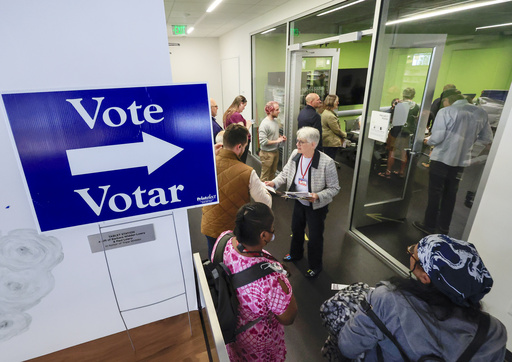
WASHINGTON — Recent polling indicates significant partisan distrust in the accuracy of election tallies for the upcoming presidential elections, with Republicans demonstrating a heightened skepticism compared to Democrats. This growing divide in confidence is underscored by findings from a recent survey conducted by the AP-NORC Center for Public Affairs Research.
Overall, voters express more confidence in local election office counts than in nationwide results. According to the survey, approximately half of registered Republicans report having “a great deal” or “quite a bit” of trust in local election officials to count votes accurately, while around 40% share similar confidence in their state’s election count. Only about 25% of Republicans, however, feel comparably confident in the nationwide results. In contrast, around three-quarters of Democrats express at least a moderate level of faith in the integrity of vote counts at all levels.
This election cycle marks the first presidential contest since former President Donald Trump’s promotion of the notion that the 2020 election was fraudulent—a belief that has contributed to the decline of public confidence in election outcomes among many conservative voters, despite a lack of evidence supporting widespread electoral fraud. Election analysts have cautioned that Trump might be preparing a similar narrative should he not win this time around.
David Farrington, a conservative resident from Fort Worth, Texas, voiced his skepticism regarding mail-in ballots and ballot drop boxes, which have frequently been targets of voter fraud accusations. “It’s not the vote count that I’m worried about,” Farrington stated. “I have every faith in all the precincts and their ability to count the ballots that are there. But the ballots — we don’t know if they’re legitimate or not.”
Conversely, Ruth Edwards, a 28-year-old kindergarten teacher in Tampa, Florida, expressed her unwavering belief in the electoral process. “I’ve never seen evidence that elections are rigged,” she said. Edwards, identifying as a Democrat, believes that allegations of rigging simply arise from disappointment over losing candidates. “It’s just people who are upset about their candidate losing who are now claiming it’s rigged with no evidence,” she asserted.
The poll reveals that, overall, voters are more inclined to trust the accuracy of vote counts at local and state levels than at the national level. Approximately 60% of voters indicate they possess “a great deal” or “quite a bit” of confidence in local election officials regarding the accuracy of votes for the 2024 presidential election, in contrast to about half who feel similar levels of trust for the national vote count. Additionally, around 25% show “a moderate amount” of confidence, while about 30% report having “only a little” or no confidence in the nationwide count.
Drew Inman, a 31-year-old Republican from New Jersey working in law enforcement, shares concerns regarding vote accuracy across different jurisdictions. “I definitely trust my vote to be counted at a local level more than I trust the national vote count,” he remarked. “When you go national, there are a lot more people involved, and that can create corruption.”
It is important to note that elections in the U.S. are decentralized; they are run by individual states and administered by local election offices in various townships and counties. Election officials frequently highlight that skepticism regarding voting results often stems from distrust of other jurisdictions, and some groups have endeavored to mitigate this perspective by promoting the integrity of local-level election management.
Older voters generally demonstrate greater confidence in electoral processes than younger voters. Approximately half of individuals aged 18 to 29 expressed at least “quite a bit” of trust in state and local counts, compared to roughly 70% of voters aged 60 and above. The difference for confidence in the national count is less stark, as about 40% of younger voters have significant confidence, while about half of older voters feel the same way.
Bill Sanchez, a 29-year-old criminal defense attorney from Pennsylvania, noted that older voters’ longer experience with elections contributes to their higher level of trust. “Younger voters have less experience voting and have spent a lot of their lives surrounded by this kind of misinformation,” he explained. “It just sets the base for younger voters to be more distrustful.”
Regarding perceptions of electoral integrity, about 60% of Republicans believe that ineligible voting is a major issue within U.S. elections, while only about 20% of Democrats share this view. There is a pronounced divide concerning mail-in ballots, with 60% of Democrats reporting significant confidence in mail ballots being correctly counted versus just 10% of Republicans. Democrats are also more likely to perceive voter suppression as a serious concern, with half expressing it as a major problem, contrasted with about one-third of Republicans.
Concerns about foreign interference in U.S. elections have lessened compared to 2020, with about 40% of voters expressing anxiety over potential tampering. Interestingly, independent voters are slightly more likely to harbor such concerns than their Democratic or Republican counterparts. Sanchez indicated that voter suppression worries him more than issues relating to fraud, advocating for broader access to early and mail-in voting to enhance election accessibility. He also highlighted the risks posed by misinformation that could incite unrest, emphasizing the importance of educating voters ahead of election day. “There’s a lot of misinformation and disinformation about election security from bad faith actors who are trying to build distrust,” he stated. “When we don’t understand things, we end up fearing them.”
The poll surveyed a total of 1,072 adults between October 11-14, 2024, using a representative sample drawn from NORC’s AmeriSpeak Panel, with a margin of error of plus or minus 4.2 percentage points for registered voters.
